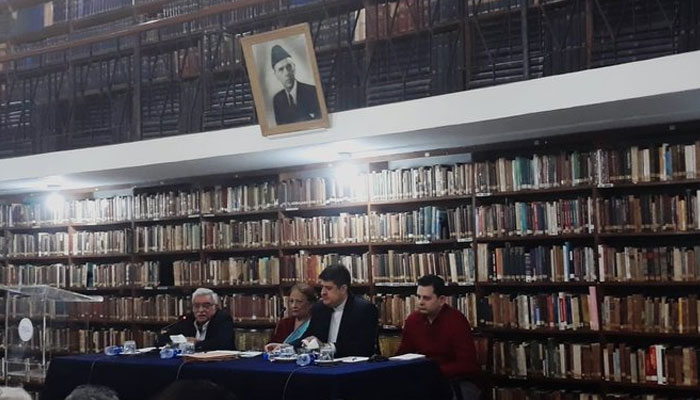‘Middle Eastern countries should devise their own regional security mechanism instead of relying on US’
The assassination of Iranian general Qassem Soleimani by the United States has caused one major effect: it has pulled Iran out of its internal turmoil, brought the whole nation on the same page along with all the pro-Iranian groups in the Middle East and Western Asia.
This was one of the observations which the three speakers, Najmuddin Shaikh, Pakistan’s former foreign secretary, Ahmed Mohammadi, consul general of Iran in Karachi, and Raza Naeem, an independent scholar, unanimously made at a talk at the Pakistan Institute of International Affairs on Saturday on the developments following the incident.
Apropos to the observation, similar sentiments also exist in the city. Around 500 metres away from the place of the talk, on MR Kayani Road along with the Supreme Court’s Karachi Registry, the Arts Council, an arts academy and a business centre are situated, where slogans have been written on walls in praise of Soleimani and in condemnation of the US. And, on January 7, thousands marched in protest to condemn the killing.
Shaikh, who has also served as Pakistan’s ambassador to Iran, commented that even the US was in confusion after this. He referred to a statement of Mike Pompeo, the secretary of state, which could only say that the attack was imminent, followed by a statement by US President Donald Trump, which claimed that they acted in defence because Iran could target four of their embassies, but they did not know which.
He said that the US asserts itself as a so-called nation of laws and rules but its deep state is perhaps still traumatised by the hostage crisis of 1979-1981 and their attitude is making things difficult in the region. “The biggest enemy of the US in the Middle East is US itself,” he remarked, appreciating Iran’s announcement of the retaliation as a wise step.
Mohammadi expressed regret over the loss of lives in the Ukrainian plane crash, which was hit by a missile fired by Iranian forces, and said that it was a human error. The consul general pledged on behalf of his government that the responsible for the loss would be held accountable and the victims compensated in the best possible way.
He, however, mentioned the Iran Air Flight 655, which was hit by American forces over the Persian Gulf, and said that the US instead of punishing the admiral responsible for the killings of 290 people gave him a medal, which was an insult to the Iranian nation.
“The US is not trustable. Some people in Iran would want to hold negotiations rather than escalating the fight, but some people, as expressed in the funeral of Soleimani, which was attended by millions of people, would want action against America,” he remarked.
He said that among the Middle Eastern countries the demand for the US to leave the region is gaining momentum because it is incapable of maintaining security. He added that the region should come up with an establishment that could secure them, instead of relying on the US.
Mohammadi said Iran is militarily capable of defending itself, yet it is willing to hold talks if the US would not deviate from its commitments. He said that now Trump has to choose which option he would like to continue with.
Naeem said that the US act was desperate and irrational and questioned what kind of civility the country showed by acting in such a manner. He said that Soleimani’s killing was illegal because he was travelling on a diplomatic passport to negotiate with the Iraqi government on a plan moved by the US itself.
-
 Nicole Kidman Celebrates Galentine’s Day Months After Keith Urban Split
Nicole Kidman Celebrates Galentine’s Day Months After Keith Urban Split -
 Justin Bieber Unveils Hailey Bieber As First Face Of SKYLRK In Intimate Campaign Debut
Justin Bieber Unveils Hailey Bieber As First Face Of SKYLRK In Intimate Campaign Debut -
 Caitlin O’Connor Says Fiance Joe Manganiello Has Changed Valentine’s Day For Her
Caitlin O’Connor Says Fiance Joe Manganiello Has Changed Valentine’s Day For Her -
 Rachel Zoe Sends Out Message For Womne With Her Post-divorce Diamond Ring
Rachel Zoe Sends Out Message For Womne With Her Post-divorce Diamond Ring -
 James Van Der Beek's Final Conversation With Director Roger Avary Laid Bare: 'We Cried'
James Van Der Beek's Final Conversation With Director Roger Avary Laid Bare: 'We Cried' -
 Jaden Smith Walks Out Of Interview After Kanye West Question At Film Premiere
Jaden Smith Walks Out Of Interview After Kanye West Question At Film Premiere -
 Why Halle Berry Wasn't Ready For Marriage After Van Hunt Popped Question? Source
Why Halle Berry Wasn't Ready For Marriage After Van Hunt Popped Question? Source -
 Michelle Obama Gets Candid About Spontaneous Decision At Piercings Tattoo
Michelle Obama Gets Candid About Spontaneous Decision At Piercings Tattoo -
 Bunnie Xo Shares Raw Confession After Year-long IVF Struggle
Bunnie Xo Shares Raw Confession After Year-long IVF Struggle -
 Brooks Nader Reveals Why She Quit Fillers After Years
Brooks Nader Reveals Why She Quit Fillers After Years -
 Travis Kelce Plays Key Role In Taylor Swift's 'Opalite' Remix
Travis Kelce Plays Key Role In Taylor Swift's 'Opalite' Remix -
 How Jennifer Aniston's 57th Birthday Went With Boyfriend Jim Curtis
How Jennifer Aniston's 57th Birthday Went With Boyfriend Jim Curtis -
 JoJo Siwa Shares Inspiring Words With Young Changemakers
JoJo Siwa Shares Inspiring Words With Young Changemakers -
 James Van Der Beek Loved Ones Breaks Silence After Fundraiser Hits $2.2M
James Van Der Beek Loved Ones Breaks Silence After Fundraiser Hits $2.2M -
 Disney’s $336m 'Snow White' Remake Ends With $170m Box Office Loss: Report
Disney’s $336m 'Snow White' Remake Ends With $170m Box Office Loss: Report -
 Travis Kelce's Mom Donna Kelce Breaks Silence On His Retirement Plans
Travis Kelce's Mom Donna Kelce Breaks Silence On His Retirement Plans




